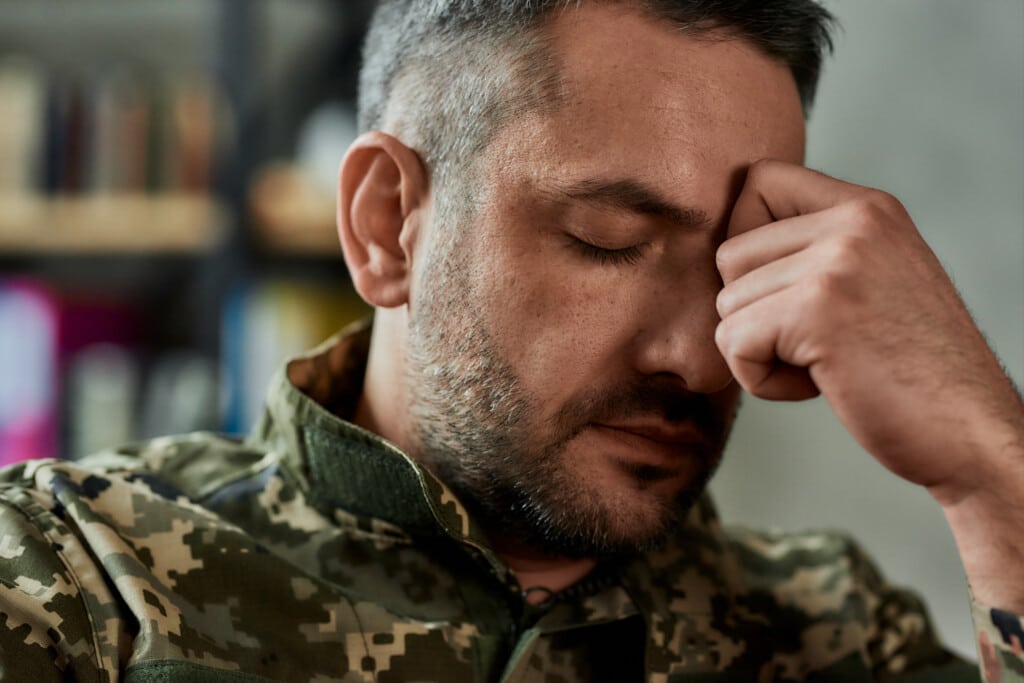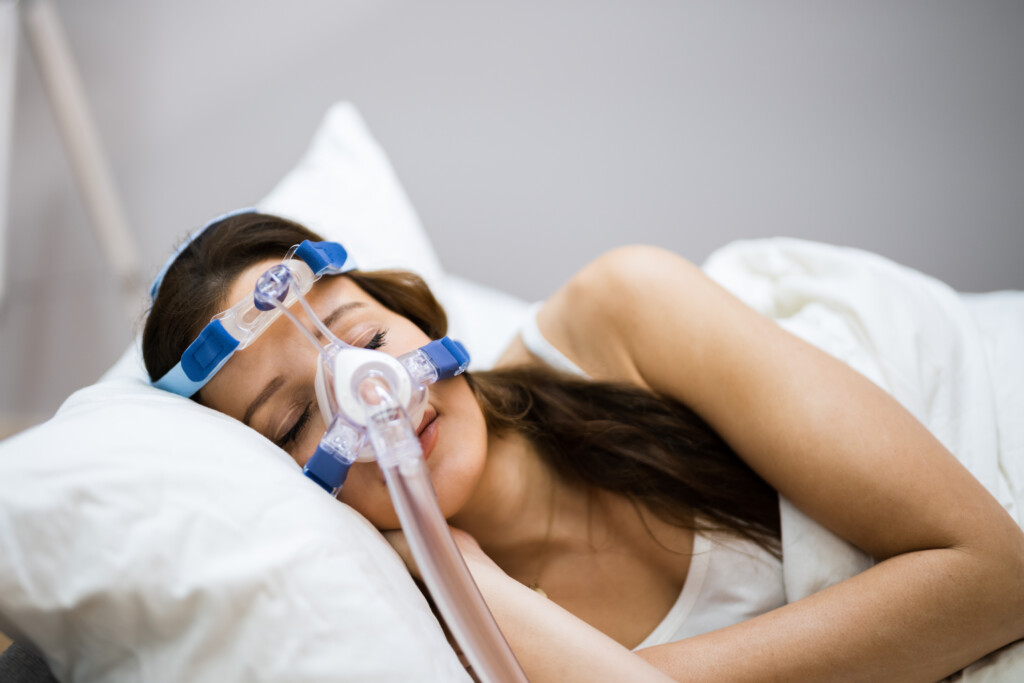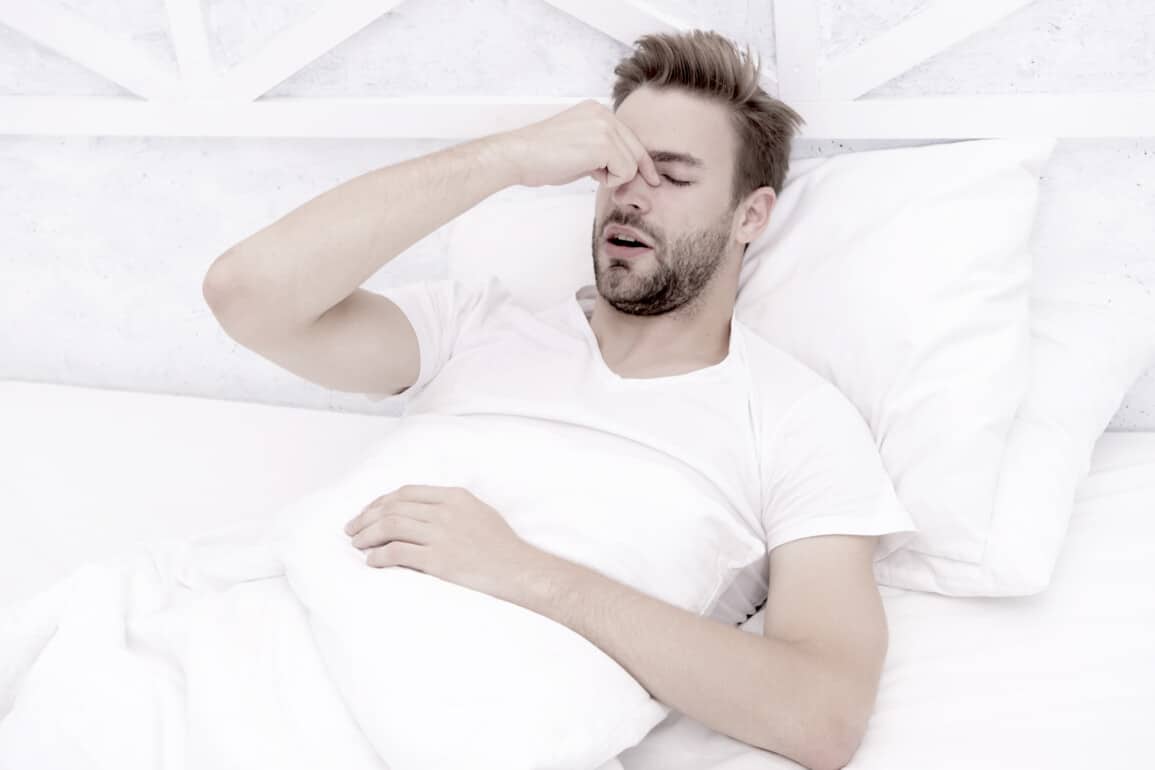The connection between PTSD and sleep apnea is a growing area of study.
Sleep apnea is among the most worrying conditions a person can have, as it involves the inability to breathe properly during periods of sleep.
There are different kinds of sleep apnea, including obstructive sleep apnea (caused by the airways being blocked). You could also suffer from central or “mixed” sleep apnea.
Reasons for the development of sleep apnea are difficult to pin down, but doctors have linked everything from obesity to muscle issues to the condition. Now, it appears PTSD and sleep apnea may also be linked.
Today, we’re going to look at the connection between PSTD and sleep apnea, and what people can do if they believe both of these conditions are affecting them in tandem.
PTSD and sleep apnea: The basics
Sleep apnea is a condition responsible for people having difficulty breathing during the night. Often it is discovered through symptoms like snoring and trouble sleeping. Sleep apnea can be a mild condition managed with lifestyle changes, or a very serious concern.
Currently, sleep apnea affects around 22 million Americans, though there may be even more people who have no idea they’re suffering from the condition.
Sleep apnea can be worsened or triggered by various factors, including age, the consumption of alcohol, smoking, poor eating habits, unhealthy eating patterns, lack of physical activity, and the use of medications.
So, can PTSD cause sleep apnea?
Post traumatic stress disorder, or PTSD, is a mental health issue that occurs following a traumatic event. Experts say up to 8% of the population will experience PTSD at some point in their lives.
People with this issue will experience various symptoms. Some have trouble eating, memory problems, or feel excessive anxiety. Sleep problems (nightmares) and insomnia are also common.
Emerging research suggests a strong connection between people with sleep apnea, and those with PTSD. Particularly, the connection seems to exist mostly between Obstructive Sleep Apnea (OSA) and PTSD.
The connection between PTSD and sleep apnea
Around 17 to 22% of the general population currently have OSA.
When you look at people with PTSD, the number ranges from 12 to 90%. According to studies, PTSD and sleep apnea do have a critical connection. People with severe PTSD symptoms may be more likely to have sleep apnea as well.
Improper breathing when you sleep is a common sign of OSA, but it’s also something that can happen if you’re struggling with PTSD.
Around 91% of victims who experienced consecutive crimes have sleep-disordered breathing. A further 95% of individuals who escaped a fire suffer from the same issue.
Veterans are particularly likely to suffer from PTSD, and men who represent a larger segment of this group, are also more likely to suffer from sleep apnea. One study found that 69% of veterans had PTSD and issues with breathing when asleep.
As mentioned above, the risk for sleep apnea increases with age, but young veterans with PTSD are more likely to have a higher risk level for their age group.
Individuals with both OSA and PTSD are likely to experience further issues like depression, increased substance abuse, and poor quality of life. Individuals developing OSA before the age of 70 also have a higher risk of early fatality.

Can PTSD cause you to stop breathing in your sleep?
Good sleep is beneficial to everyone.
In people with PTSD, sleeping well could be particularly crucial. Sleep helps to heal the mind and body, making it easier for us to cope with emotional and difficult situations.
Studies show that sleep helps to facilitate the removal of various fears and bad memories from our minds. Just as your brain learns to consolidate events in REM sleep, it also helps to adjust the fear associated with certain memories, therefore improving PTSD symptoms.
Both fear removal and nightmares occur during REM sleep too. When a person with PTSD wakes up from a nightmare, it disturbs their sleep and interrupts the process. If the individual suffers with sleep apnea, then this will also disturb the sleep, making recovery from PTSD less likely.
So, does PTSD cause sleep apnea?
One study suggests that psychiatric disorders and OSA can have a “bidirectional” relationship. This essentially means that the presence of one condition can make the other worse. So far it’s difficult to say whether PTSD will actually cause sleep apnea or not.
People with worse cases of sleep apnea can also have more severe PTSD. At the same time, the worse PTSD is for someone, the worse their OSA becomes. Each clinically significant increase in PTSD symptom severity can increase a veteran’s risk of OSA by 40%.
Stress and sleep apnea go hand-in-hand
The truth is that stress has a massive impact on our ability to sleep well.
If you’re stressed and your mind is racing with thoughts, you can’t get a good night’s sleep. The disturbed sleep caused by sleep apnea can also lead to symptoms of sleep deprivation, which makes the issues of PTSD even worse.
Even if you don’t wake up during a period of OSA, you will experience an impact on the sympathetic nervous system. Sleep quality therefore reduces, impairing mood and reducing a person’s susceptibility to therapies.
Because difficulty sleeping is a common part of PTSD, many experts often recommend using sleep hygiene strategies for treatment. However, it can also be useful to look into talk therapies and medication.
Doctors can recommend things like, following a stricter sleep schedule, adopting a new bedtime routine, and reducing alcohol intake.
For severe symptoms of sleep apnea, the best treatment is usually CPAP therapy, or continuous positive airway pressure. In this treatment, you were a mask connected to a CPAP machine when you go to bed each night.
The mask keeps the airways open and reduces the risk of episodes. Fortunately, evidence indicates that CPAP support can improve sleep apnea symptoms and PTSD too. The results can be improved quality of life, fewer nightmares, and reduced depression.

Can you cure PTSD and sleep apnea?
Sleep apnea and PTSD are two complicated conditions.
Finding the right treatment means pursuing help from a professional who can tailor the treatment plan you need to your situation. Unfortunately, there are some issues with PTSD and sleep apnea.
Adherence to CPAP therapy is less common than most doctors would like because sleeping with a mask on can be an uncomfortable experience.
Individuals with PTSD may struggle to keep their masks on when suffering from discomfort, nightmares, and feelings of claustrophobia which can arise during sleep.
A small study of veterans found that among people without PTSD, 70% did adhere to CPAP therapy. However, less than 50% showed ongoing adherence.
The good news is that those who do follow through with the correct treatment can see significant benefits. The more you use your CPAP therapy, the more the positive impact increases. Specifically, CPAP can reduce the frequency of nightmares by up to 50% and can significantly lower feelings of distress and daytime sleepiness.
Although both sleep apnea and PTSD are worrying conditions, it’s important to note that treatment options are available to help anyone overcome these problems with time. The key to success is following the guidance provided by your doctor.
Get help for sleep apnea and PTSD
If you’re having trouble with sleeping at any point, due to anxiety, feelings of stress, or symptoms of PTSD, you should speak to a doctor as soon as possible. If your sleep partner complains of loud snoring, or mentions changes in your breathing during sleep, speak to a professional.
It’s also important to seek help if you wake up gasping in the night and wake up feeling exhausted after a long night of rest. Other symptoms can be waking up with a dry mouth, headaches and daytime sleepiness.
The faster you speak to a doctor about your sleep concerns and conditions, the quicker you can get the kind of treatment you need to overcome these problems. Remember, CPAP and talk therapies both have a profound impact over time.
Siestio. Sleep Matters.
Medical disclaimer
You must not rely on the information provided on our website as an alternative to medical advice from your doctor or other healthcare professionals. For more information read our full disclaimer here.







